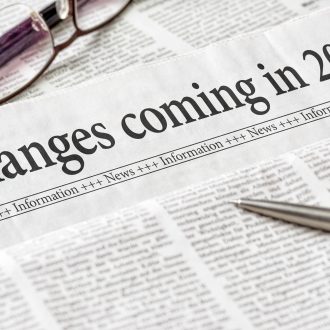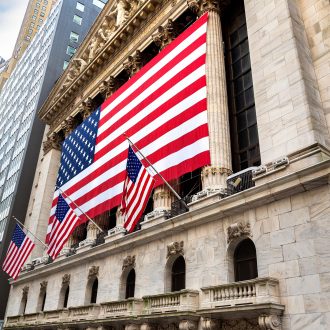
I’ve been reading magazines lately and jotting down interesting excerpts. These quotes include “…interest rates have shot up higher than anyone could have imagined…,” “looming recession, government paralysis, and the threat of war,” “voters are indeed angry” and “Americans are…worried about their financial future.” Some of you may be nodding your heads. Would it shock you to know that those selections are from 1982, 1990, 1991, and 2002, respectively?” Credit to Time Magazine for the first, second, and fourth quotes and The Washington Post for the third.
Those quotes did appear during challenging times for the US economy, but also during or on the eve of monetary policy easing. It’s perhaps no surprise then that they also marked the beginning of prolonged market advances, albeit with inevitable volatility along the way.
The more things change, well, you know the rest.
All these comments prompted me to touch a little more on today’s two topics about the way markets tend to move at the onset of rate cutting cycles and the unfortunate way America is often characterized during election cycles.
Don’t Fight the Fed
There’s little doubt you’ve heard this phrase before. Markets do indeed tend to prefer a falling rate environment to a rising one. In short, “don’t fight the Fed” is a good adage to adhere to.
But it is important to consider a common shape of market events throughout the Fed’s rate cutting cycle.
Since it appears obvious the Fed is about to embark on a rate cutting path, I thought it would be good to keep things in perspective and look objectively at how these cycles usually play out. History shows that stocks perform fairly well throughout rate cutting cycles, but it’s not a straight line.
Does an initial rate cut tell investors it’ll all be easy and to go full steam ahead?
Those of us eager for college football season to start might like to hear from legendary coach and ESPN icon Lee Corso here: “not so fast, my friend”.
Ironically, stocks tend to move a bit lower after the Fed’s first rate cut. There are two likely contributing factors.
First is another common adage of “buy the rumor, sell the news”. The thought process here is that the market has already priced-in whatever anticipated event is on the horizon and has likely, in fact, overvalued it.
Second is the question of “now what”? Once the known event has occurred, speculation arises anew. Was that actually the right move? Does the Fed maybe know something more about the cyclical weakness that necessitated this initial cut? If their press conferences and interviews sound too much like a rescue than a rationale, maybe they’re too far behind and they haven’t been able to avoid the rocks of a recession.
In other words, ever-present investor fears simply hop from one lily pad to the next. And mark my words, the stubborn bears who have been wrong throughout the economic recovery phase will distort headlines to somehow rewrite history to build their next case. Those new threats will likely include phrases like “desperate Fed”, “recognition of a major problem brewing”, and even some sort of “I told you so”. You can count on these pessimists to be at least these few things: confident, wrong, and loud. They’ll be welcomed guests on all the financial channels that thrive on heated debate and profit by creating fog.
Bottom line, it’s common for the first stage of a Fed rate cutting cycle to be counterintuitively lower for stocks. Ignore this. It doesn’t have a history of being a long enough dip for investors to game. It’s better to not doubt the future direction just because the first step in the “don’t fight the Fed” playbook is often a bit defensive. This is because history is clear on where stocks go in the quarters and months that follow that initial cut, which is higher.
America Stinks!
I am mad at myself for not having written this next piece a long time ago.
I’ve been in this industry for over 30 years, since the days of the first Clinton election win. If the Lee Corso reference earlier wasn’t familiar to you, I’ll try Principal Ed Rooney of Ferris Bueller fame by saying this marks “nine times” that I’ll have waded through the election cycle. Yes, nine times that I’ll have walked this “primrose path”. Anyone….anyone? OK, I’ll stop with the Sausage King of Chicago references to avoid losing the point. Which is that apparently:
America Stinks!
Or so we’re told every four years around this time.
Gone are the days of any candidate anchoring their campaign around their own virtues, values or visions. The fact that We The People are all so similar in our desires for ourselves and our loved ones is sacrificed to the exaggerated claims of just how different we all are. And there certainly is no clear, concise framework for what to expect, or heaven forbid, hold any candidate accountable to should they be elected.
Instead, far more time is invested in attacks of all forms on the other candidate. A dystopian view of America as it stands and will be forced to remain until it disintegrates under the other side’s intentional leadership to a place of hate, despair, and certain destruction is the central theme. When you turn on the nightly news, are the sound bites optimistic or vitriol? It doesn’t matter the channel, and it doesn’t matter who plays the role of the hero or the heel. Because these days we all know what script and cast you’ll get on each channel. Take a minute to wonder if this noise of the season changes much of what is being done inside the halls of Fortune 500 companies. Sure, they have their lobbyists and accountants working on various contingency plans, as they should. But those things, as decades of growth and earnings expansion show us, operate more as fringe elements and don’t dictate the core functions. It’s the creation and delivery of goods and services for the collective benefit of the company, its employees, and the rational consumer that drives their missions and their profits.
The many strengths of the American society and economic system are ignored if not called into question pretty much every time the Summer Olympics end. We get to these final months before the election and the rhetoric is amplified. And when the vast majority of the messaging is just how bad the other side is and how much they’ve ruined America, it is hard to want to invest in the future.
Fortunately the future of America relies more on entrepreneurs and consumers than politicians and bureaucrats. As investors, we have the opportunity to share in the continued growth of the world’s most impressive economy of the last few centuries. You don’t earn that position in the world without being nimble, multi-faceted, and confident. America and its resilient economy certainly do not stink. So while we have to periodically endure the negative news flow that accompanies an election cycle, we more often get to appreciate the freedoms and prosperity that come with the noise of the checks and balances our founding fathers had the foresight to know we’d need.
The America Stinks battle cry might literally scare up a few votes, but that mindset is bunk. No, America is not perfect; it is inhabited by humans after all. But the heart and soul of this nation is good, and the benefits of our collective efforts have taken this nation to great heights. Every time we think a ceiling has been hit, along comes the next innovation to fuel our imaginations and make us more productive and, hopefully, fulfilled.
Mark Twain said, “The reports of my death have been greatly exaggerated.” What an American thing to say…
The Takeaways:
- It makes sense for investors to grow optimistic as the Fed moves closer to lowering rates. History suggests markets will hold steady and rise in the years to follow.
- Lower interest rates from the Fed aren’t the only market force that matters, and investors should not be tempted to stray from their normal risk profile in any way.
- It’s unfortunate that Americans are force-fed pessimism during election cycles. Especially about a country that constantly reinforces the message of optimism!
- While I’m sure you have a preference for who wins the election, keep in mind that your portfolio likely doesn’t. American businesses will continue to serve their customers with the aim of creating value for all involved. So, it’s best to be involved.
Disclosure
Securities offered through International Assets Advisory, LLC (“IAA”) – Member FINRA/SIPC. Advisory services offered through International Assets Investment Management, LLC (“IAIM”) or Global Assets Advisory LLC (“GAA”) – SEC Registered Investment Advisor(s). IAA, IAIM, and GAA are affiliated entities.
The information provided is based on carefully selected sources, believed to be reliable, but whose accuracy or completeness cannot be guaranteed. Any opinion herein reflects our judgment at this date and is subject to change without notice. This should not be construed as an offer or solicitation to buy or sell securities. This information is not intended to be legal or tax advice. Please consult a tax, legal, or financial professional with questions.
Investors should consider the investment objective, risks, and charges and expenses before investing. Different types of investments involve varying degrees of risk, and there can be no assurance that any specific investment will be either suitable or profitable for a client or prospective client’s wealth management investment portfolio. Past performance is not an indication of future performance. International Assets Advisory, LLC and its affiliates, employees and/or directors may have positions in these securities, and may as principal or agent, buy from or sell to customers. All securities are subject to price and yield change and subject to availability. Investments in securities and insurance products are: NOT FDIC-INSURED/NOT BANK-GUARANTEED/MAY LOSE VALUE. Stocks, options, and mutual funds are subject to market volatility and may lose value. Mutual funds, Unit Investment Trusts and Variable Annuities are sold by prospectus only. Please read the prospectus carefully for important information about fees and risk considerations. Bonds are subject to changes in interest rates, risks of defaults by issuer, and the loss of purchasing power due to inflation, or the risk that an issuer will be unable to make interest or principal payments. Additionally, bonds and short-term investments entail greater inflation risk than stocks. Any fixed-income security sold or redeemed prior to maturity may be subject to a substantial gain or loss. Investing in securities underlying in currencies other than the U.S. dollar involves certain considerations comprising both risk and opportunity not typically associated with investing in U.S. securities. The security may be affected either favorably or unfavorably by fluctuation in the relative rates of exchange between currencies, by exchange control regulations, or by indigenous economic and political developments.



